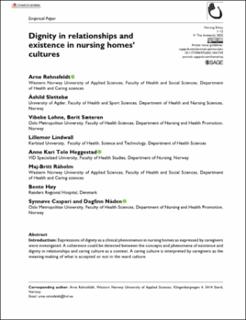| dc.contributor.author | Rehnsfeldt, Arne Wilhelm | |
| dc.contributor.author | Slettebø, Åshild | |
| dc.contributor.author | Lohne, Vibeke | |
| dc.contributor.author | Sæteren, Berit | |
| dc.contributor.author | Lindwall, Lillemor | |
| dc.contributor.author | Heggestad, Anne Kari Tolo | |
| dc.contributor.author | Råholm, Maj-Britt | |
| dc.contributor.author | Høy, Bente | |
| dc.contributor.author | Caspari, Synnøve | |
| dc.contributor.author | Nåden, Dagfinn | |
| dc.date.accessioned | 2022-09-20T13:04:19Z | |
| dc.date.available | 2022-09-20T13:04:19Z | |
| dc.date.created | 2022-09-13T17:34:30Z | |
| dc.date.issued | 2022 | |
| dc.identifier.citation | Nursing Ethics. 2022, 1-12 | en_US |
| dc.identifier.issn | 0969-7330 | |
| dc.identifier.uri | https://hdl.handle.net/11250/3019201 | |
| dc.description.abstract | Introduction: Expressions of dignity as a clinical phenomenon in nursing homes as expressed by caregivers were investigated. A coherence could be detected between the concepts and phenomena of existence and dignity in relationships and caring culture as a context. A caring culture is interpreted by caregivers as the meaning-making of what is accepted or not in the ward culture.
Background: The rationale for the connection between existence and dignity in relationships and caring culture is that suffering is a part of existence, as well as compassion in relieving suffering, and ontological interdependency.
Aim: To describe different expressions of dignity in relationships and existence in context of caring cultures from the perspective of the caregivers.
Research design: The methodology and method are hermeneutic. The method used was to merge the theoretical preunderstanding as one horizon of understanding with empirical data.
Participants and research context: Focus group interviews with caregivers in nursing homes.
Ethical considerations: The principles of the Helsinki Declaration have been followed to, for example, preserve self-determination, integrity, dignity, confidentiality and privacy of the research persons.
Findings: Data interpretation resulted in four themes: Encountering existential needs that promote dignity in a caring culture; To amplify dignity in relationships by the creative art of caring in a caring culture; Violation of dignity by ignorance or neglect in a non-caring culture and The ethic of words and appropriated ground values in a caring culture.
Discussion: Dignity-promoting acts of caring, or dignity-depriving acts of non-caring are adequate to see from the perspective of dignity in relationships and existence and the caring culture.
Conclusions: Dignity in relationships seems to touch the innermost existential life, as the existential life is dependent on confirmation from others. | en_US |
| dc.language.iso | eng | en_US |
| dc.publisher | Sage | en_US |
| dc.rights | Navngivelse 4.0 Internasjonal | * |
| dc.rights.uri | http://creativecommons.org/licenses/by/4.0/deed.no | * |
| dc.subject | hermeneutics | en_US |
| dc.subject | existential | en_US |
| dc.subject | existence | en_US |
| dc.subject | ethics | en_US |
| dc.subject | dignity in relationships | en_US |
| dc.subject | dignity | en_US |
| dc.subject | caring culture | en_US |
| dc.title | Dignity in relationships and existence in nursing homes’ cultures | en_US |
| dc.type | Peer reviewed | en_US |
| dc.type | Journal article | en_US |
| dc.description.version | publishedVersion | en_US |
| dc.rights.holder | © The Author(s) 2022 | en_US |
| dc.source.pagenumber | 1-12 | en_US |
| dc.source.journal | Nursing Ethics | en_US |
| dc.identifier.cristin | 2051393 | |
| cristin.ispublished | true | |
| cristin.fulltext | original | |
| cristin.qualitycode | 2 | |

